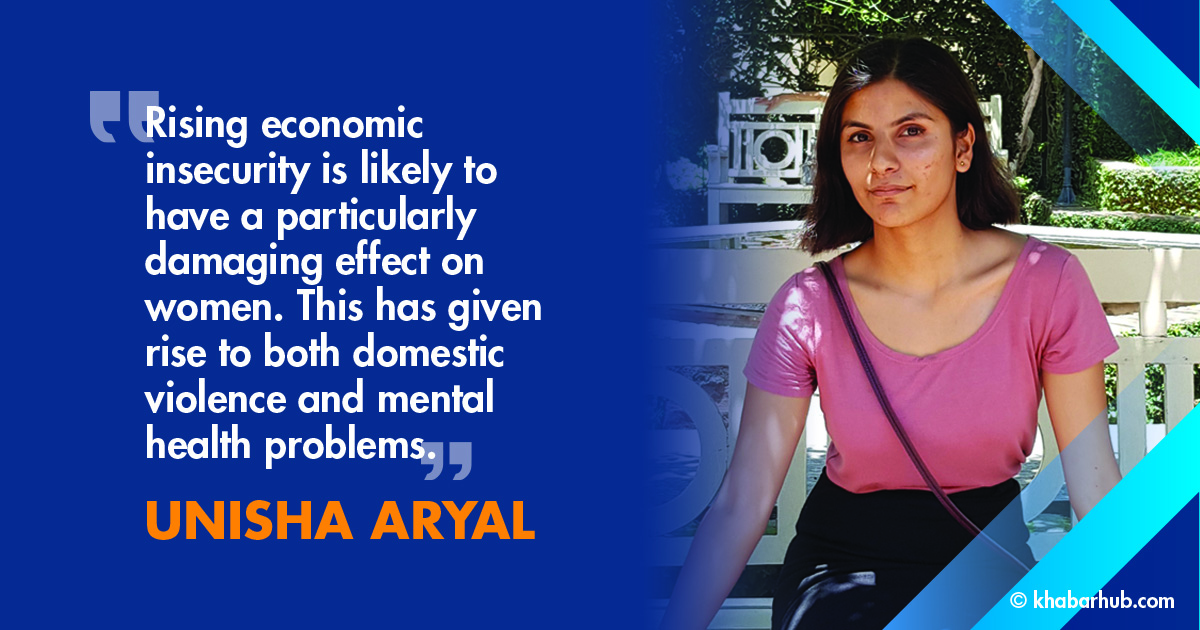COVID-19 has taken the form of a global pandemic. The number of cases is growing rapidly and the World Health Organization (WHO) has stated that the pandemic will not end any time soon.
The fatality rate of the virus is very low, yet it still seems beyond the control of a single country and international community. Therefore, several countries have imposed lockdown to stem the spread of coronavirus.
Lockdown has been a necessary evil in the sense that though enforced to curb the pandemic, it has invited many socio-economic problems and mental health issues. There has been a significant loss of a job — particularly affecting the working class.
Another group that is adversely impacted is women. This group, especially with disabilities, from marginalized communities and the poor economic background, is hit hard by the crisis.
Decisions made at every level of the response to the pandemic are resulting in women losing their jobs, getting paid low and suffering from many health hazards like pregnancy, domestic violence, and torture as well as mental pressure.
Women in different classes and the profession of society have faced different problems and consequences.
Domestic worker women
Up to 85 percent of domestic workers lost their jobs during the lockdown and most people not losing jobs are not paid full.
Domestic workers are mostly women, and even those domestic workers who go to work in others’ houses to support their families have become jobless now because of which their children and other dependents have suffered a lot.
The livelihood has got worse as they have nothing to pay for food, education, house rent, etc. How could one manage with just half of the salary when the price of the goods and services is skyrocketing? The joblessness of working-class couples and economic crises has increased domestic violence.
Pregnant women
The pandemic has put people of all ages and genders at risk, but pregnant women face some extra challenges.
Access to health care has been somehow disturbed by the restrictions on movement. The frightening stories of pandemic transmission through health centers and hospitals have added further anxiety.
Women are panicked and are hesitant about visiting the health care centers for consultation. During the first phase of lockdown, 56 new mothers died whereas 60,000 women were deprived of the health care deemed essential.
The pandemic and lockdown should not be used excessively as it curtails the indispensable sexual and reproductive health rights, which should rather be prioritized, funded and made accessible. Health care for pregnant women is supremely important.
Women at home with family members losing a job
Pandemic induced restriction on movement and the loss of a job has increased the instances of domestic violence and worsened mental health as well. The women have not only lost the job but also have been exposed to hardship.
Living with their husbands who have also lost their jobs are under stress somehow hence increasing the chances of domestic violence.
Unfortunately, women cannot even turn towards their parental home (parent’s home) seeking support as they cannot visit them. Access to welfare organizations also turns feebler on such occasions.
Besides, the quarantines arranged for coronavirus suspects and patients are not children, girls, and women-friendly.
There have been some cases of women and girls being raped in their own house or quarantine. Likewise, there have been some instances of acid attacks as well.
Increased abuse is a pattern repeated in many emergencies, whether conflict, economic crisis or during disease outbreaks; what to say, the quarantine rules pose particularly grave challenges.
Health worker women
Women make up almost 70 percent of the healthcare workforce, exposing them to a greater risk of infection. Women are leading the response to the biggest public health crisis of the century.
The women in the health sector have a hectic schedule in the time of this crisis as well. The fear of getting contracted with viruses along with the moral dilemma of transmission of the virus to the family members has been hard on health workers.
Men and women from all sections of society are undergoing numerous problems but women at lower social strata and conservative families are facing a serious problem due to the social and economic status.
Many nurses and doctors have already succumbed to the virus. Though the salary of health workers hasn’t been reduced due to the pandemic, we all know the problem in the health sector, nurses are paid less.
Most of the women in other sectors also fare no good.
There were many hurdles in the labor market for career seeking women even before the pandemic outbreak, now the situation is worse.
Despite the remarkable progress made by women over the past half-century, women’s position in the labor market remains very different from men’s.
Due to this women are likely to be more vulnerable than men to any crisis-driven loss of income. Rising economic insecurity is likely to have a particularly damaging effect on women as seen through the last recession in 2008.
In this regard, policies of aid to recover the economy should have a special package for women in a different situation.
Everyone is affected by the pandemic but the economically weak and individuals from vulnerable groups are suffering more as seen in every crisis.
Men and women from all sections of society are undergoing numerous problems but women at lower social strata and conservative families are facing a serious problem due to the social and economic status.
A gender perspective approach in the fight against the pandemic must help us to understand, analyze its short-term and long-term threats to the venerable group of women in the society and better prepare us for the crisis.









Comment